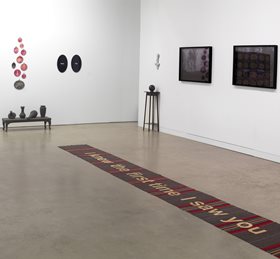.aspx) Wog Bitch
Wog Bitch
Olga Cironis by Louise Morrison
In the build up to the recent Federal election, Olga Cironis was bemused by people who wanted to ‘talk about something nice instead’. Such polite chatter seems “insipidly beige” to Olga who attributes their distaste for impassioned political debate to a lack of empathy.
The artist’s experiences as a migrant and as a woman frame the critiques of our political, social and economic structures that underpin her visual arts practise. There is little that separates life and art in Olga’s view and, whilst she accepts that formal concerns and materiality can be important, she is impatient with ‘art about art’. “It’s because I’m a Wog,” she concludes.
Olga Cironis was born to Greek parents in Czechoslovakia in 1963. Her parents had been moved to relative safety there, as children, during the Greek Civil War (1946-1949) and had met, married and remained there until 1971. When the Czech government offered assisted repatriation to Greek citizens, the family emigrated to Sydney.
Quietly prevented from settling anywhere they wanted and obtaining work for which they were qualified, Olga’s parents secured poorly paid work and a home in a low socio-economic area. When she critiques Australia’s capitalist economic system or our treatment of refugees, it’s not without insight.
Inequality riles Olga and she is determined to expose the myth that wealth, power and a sense of belonging are equally available to all in this fair and lucky country. The notion of The Other is central to her argument and it does not include those whose fashionable acceptance by the mainstream facilitates their absorption into it. She focuses on the experiences of those who occupy truly peripheral positions.
 Olga’s works articulate the experience of Otherness, hers and that of those she encounters, but any clear narrative is prevented by carefully constructed ambiguity. This is usually achieved through a disturbing interplay between material, form and text. Old woolen blankets evoke warmth and comfort but Olga uses them to completely encase familiar forms so that they simultaneously seem to protect and smother them. In other works, swatches of blankets act as a pretty support for tenderly hand-stitched insults and expletives. All elements in her works are sourced from the realms of The Other but their origins are obscured when they’re fragmented and untethered from their contexts.
Olga’s works articulate the experience of Otherness, hers and that of those she encounters, but any clear narrative is prevented by carefully constructed ambiguity. This is usually achieved through a disturbing interplay between material, form and text. Old woolen blankets evoke warmth and comfort but Olga uses them to completely encase familiar forms so that they simultaneously seem to protect and smother them. In other works, swatches of blankets act as a pretty support for tenderly hand-stitched insults and expletives. All elements in her works are sourced from the realms of The Other but their origins are obscured when they’re fragmented and untethered from their contexts.
In recent works, Olga re-presents commonly used terms that serve to denigrate women and migrants. In doing so, she simultaneously distils their power and claims it for herself, defusing its capacity to cause further harm. Whilst critics argue against the strategy of resignification, accusing it of being complicit, it has been utilised by women (Bitch), homosexual men (Queer), African Americans (Nigga) and Indigenous Australians (Blak) in recent decades. In the same way Gordon Bennett used text in his early works, Olga’s appropriation of signifiers invites us into her world and, at the same time, forces us to examine our own.
“I use and abuse art to communicate and create dialogue, to make sense of the world, even rage against it. Why not?..
"Life is too short to be passive in the face of adversity."
... Blame my heritage, blame my sex, anything but nothing,” says Olga.
-
Olga is included in our online Artist Gallery and Database. Click here to see her profile.
Louise Morrison is an artist and a lecturer at Central Institute of Technology. She is studying towards a Masters in Art History and Curatorial Studies with a focus on historical and contemporary practise in Western Australia.
This article featured in the Artsource Nesletter, Summer 2013.